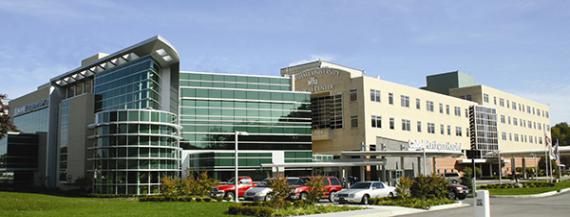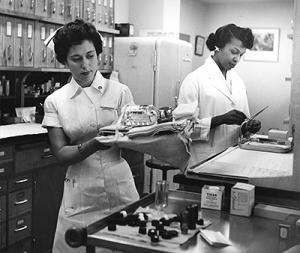Pharmacy Residency Program
The pharmacy residency programs provides advanced knowledge and skills regarding drug therapy and pharmacy services in a hospital setting.
About Cabell Huntington Hospital

Cabell Huntington Hospital is a regional referral center offering a multitude of services including Level II trauma center, Level III neonatal center, oncology center, burn unit, pediatric, surgical, and medical intensive care units. Cabell is affiliated with Marshall University Schools of Medicine and Pharmacy.
Pharmacy Residency Rotation Information
The resident is required to complete twelve (12) months of practice experience rotations during their residency for successful completion. Rotations are determined by program requirements, resident’s interests, and personal and professional goals for completing their residency program.
Residents are expected to function independently and demonstrate proficiency throughout the rotation as documented on evaluations. Preceptors are responsible for ensuring rotation and program goals. Objectives are met through specific activities to be completed during the rotation, such as providing mentorship and teaching the principles of pharmacy practice through incorporation of the four teaching models (instructing, modeling, coaching, and facilitating). The preceptor is responsible for providing the resident with the rotation syllabus, establishing a schedule and providing ongoing feedback and timely evaluations.
Types of Rotations

Our hospital's first pharmacy, circa 1956.
Core/required: Core rotations are five-week-long rotations that will provide the resident with essential skills that will meet the required goals and objectives of the residency program. Core rotations will also provide the resident with the ability to gain experience in diverse patient populations, a variety of disease states and a range of complexity of patient problems. The core rotations will also provide the resident with the skills needed to perform as an independent learning on an elective rotation.
Elective: Elective rotations are five week-long rotations that are offered to a resident to promote additional experience in an area of interest that will meet the resident’s personal goals and objectives. Certain core rotations must be completed prior to the assignment of an elective rotation.
Longitudinal: Longitudinal rotations are completed independently with minimal direct oversight from a preceptor. Expectations and requirements of a longitudinal rotation are completed throughout the year with evaluations of progress made on a quarterly basis.
PGY-1 Residency Program PGY-2 Residency Program
Diversity, Equity and Inclusion
The Marshall Health Network Pharmacy Services Diversity, Equity and Inclusion Committee was formed in 2023 to build and retain a diverse workforce, provide equitable opportunities, and foster an inclusive workplace. We commit to building a community of individuals, free of discrimination, with diverse backgrounds and life experiences, including, but not limited to: ethnic, national, geographic, racial, or religious origin, gender identity or expression, sexual orientation, socioeconomic status, veteran status, people with disability, or age.
Learn more from ASHP and Marshall Health Network.
Contact Information
Allison Fisher, PharmD, BCCCP
Clinical Pharmacy Supervisor | PGY1 Residency Program Director | PGY2 Critical Care Interim Residency Program Director
Cabell Huntington Hospital | 1340 Hal Greer Blvd | Huntington, WV 25701
allison.fisher@chhi.org
Stephanie Justice, PharmD, BCPS, CPEL
Director of Pharmacy Services
Cabell Huntington Hospital | 1340 Hal Greer Blvd | Huntington, WV 25701
stephanie.justice@chhi.org
About Huntington, West Virginia
Located on the Ohio River at the point where West Virginia, Ohio and Kentucky meet, Huntington is home to educational and cultural opportunities as well as one of the largest river ports in the United States. Learn more.